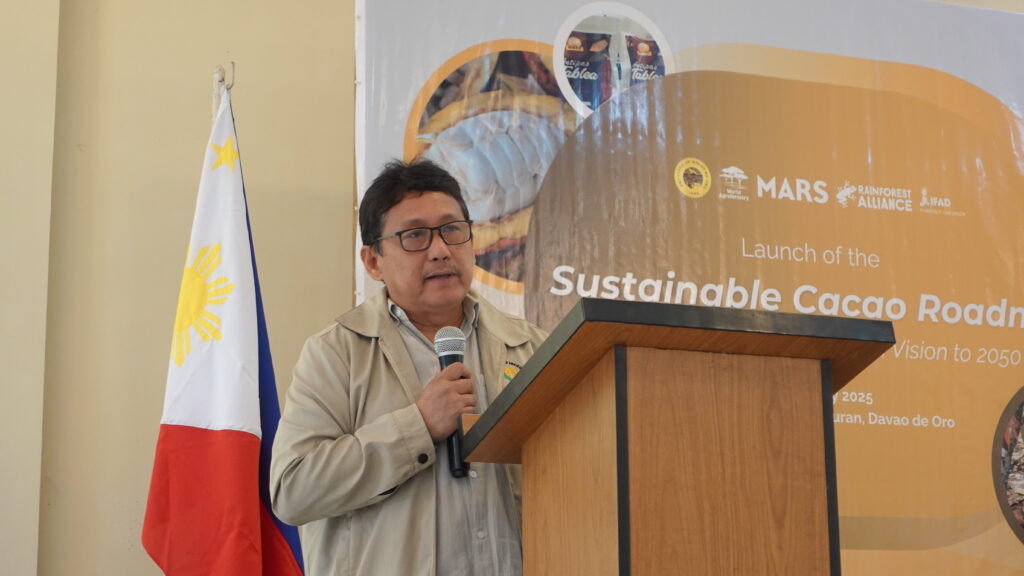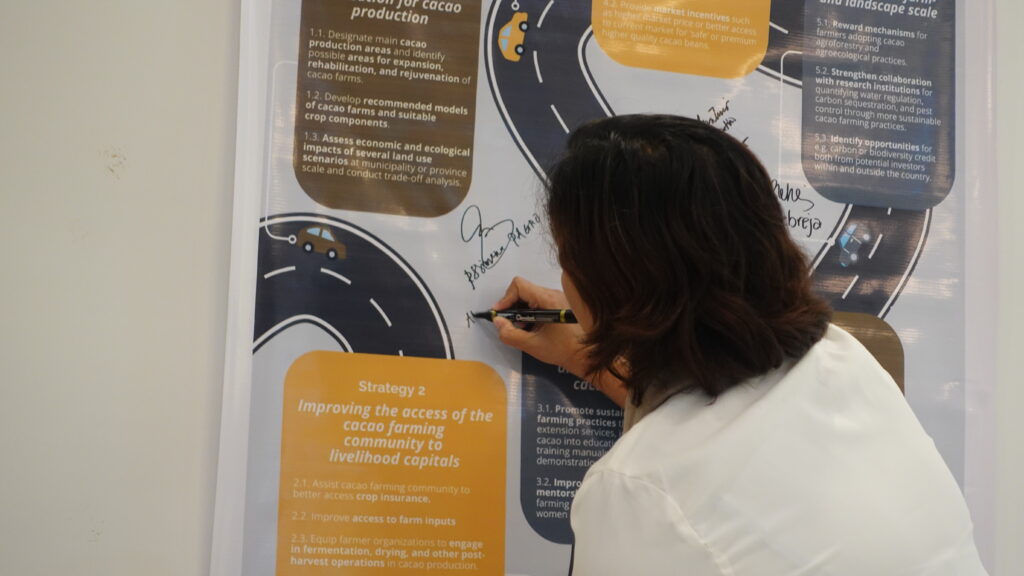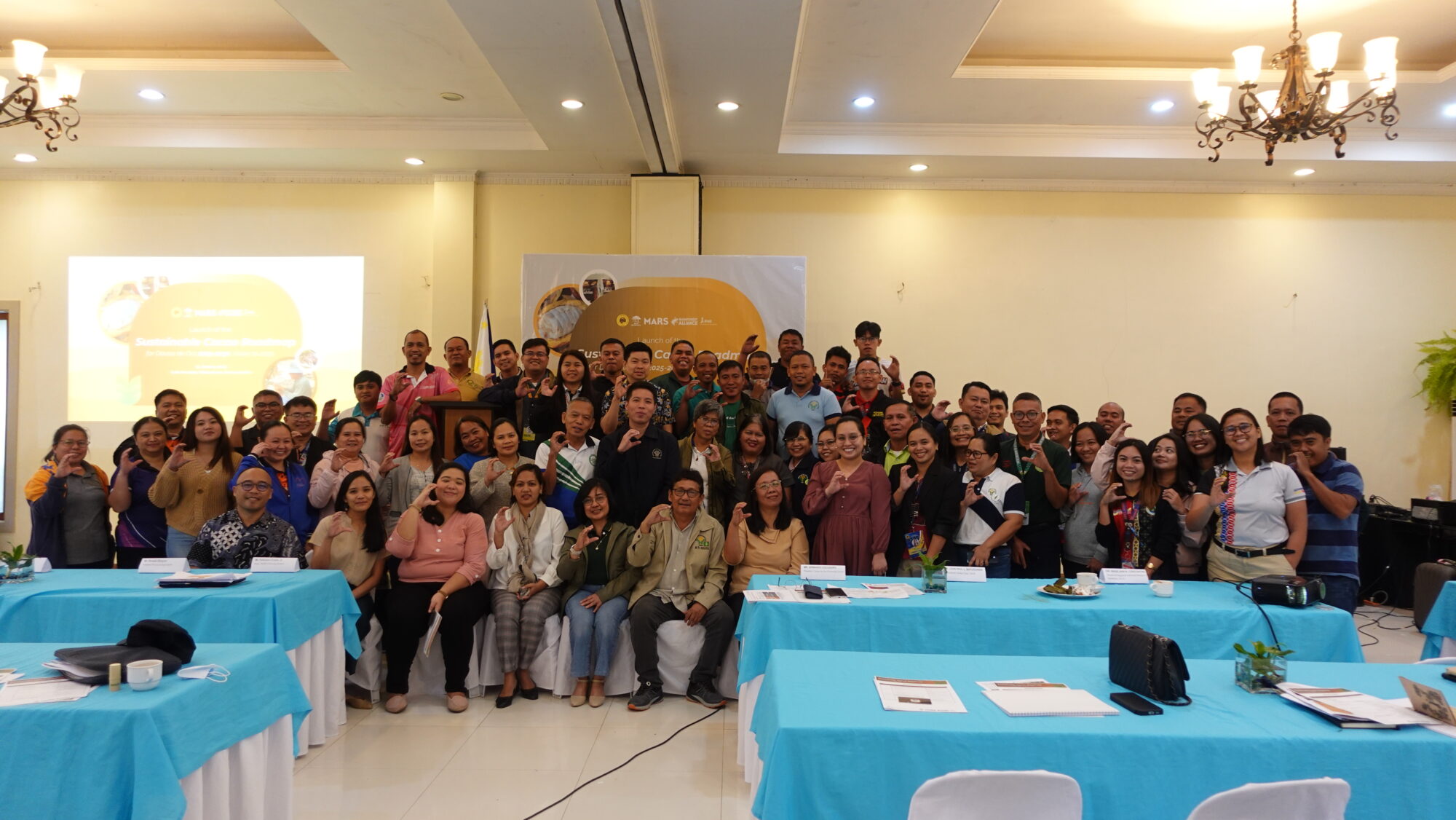The province of Davao de Oro is taking a bold step toward revolutionizing its cacao industry with the official launch of its Sustainable Cacao Roadmap for 2025-2030, Vision to 2050 last 15 January 2025 at Café Noventa, Nabunturan, Davao de Oro.
This groundbreaking initiative, developed through the collaborative efforts of the Sustainable Farming in Tropical Asian Landscapes (SFITAL) Project and local stakeholders led by the Davao de Oro Provincial Agriculture Office, offers a blueprint for tackling long-standing challenges in the cacao sector while charting a path toward sustainability and economic growth.

Dr. Rolando Simene, OIC Provincial Agriculture of Davao de Oro, expresses his gratitude to all the institutions who took part in the development of the Sustainable Cacao Roadmap for the Province.
The roadmap, covering the years 2025 to 2030 and with a vision extending to 2050, is a product of extensive research, community engagement, and multi-sectoral collaboration. It aims to address critical issues such as declining productivity, pests and diseases, unsustainable farming practices, and the economic pressures that have driven many cacao farmers to leave the industry. For Davao de Oro’s cacao growers, this roadmap represents a lifeline, as well as an opportunity to lead the charge for sustainable farming in the Philippines.
“This roadmap will serve as our guide for the implementation of cacao development programs in Davao de Oro,” Dr. Rolando Simene, OIC Provincial Agriculturist, explained as he welcomed the participants and highlighted the need to take action to ensure the sustainability of the province’s cacao industry.
Davao Region has played a key role in the country’s cacao industry, contributing to 78% of national cacao output. However, behind this success lies a set of challenges that threaten the long-term viability of the industry. From climate impacts to market pressures, farmers have struggled to keep pace, including those in Davao de Oro as part of the region.
Recognizing these hurdles, the SFITAL Project began laying the groundwork in 2020 by updating land use maps, conducting suitability analyses for cacao farming, and assessing the profitability of various land uses. The Project also conducted a review of existing plans and roadmaps including the Philippine Cacao Industry Roadmap, the Davao Region Industry Cluster Development Program, and Davao de Oro’s Provincial Commodity Investment Plan, among others.
The roadmap’s creation also involved a series of planning workshops in 2024, bringing together stakeholders from local government units, farmer organizations, cooperatives, academia, and private businesses. Over the course of these workshops, participants crafted a shared vision and identified actionable strategies to address the sector’s needs.
The result is a roadmap built on six core strategies, each tailored to strengthen the industry and empower its stakeholders. The six strategies are 1) sustainable land use allocation for cacao production, 2) improving the access of cacao farming community to livelihood capitals, 3) increasing the productivity and income diversification of cacao farms, 4) sustainable improvement of the cacao supply and market value chain, 5) incentivizing ecosystem services generated at farm- and landscape-scale, and 6) strengthening institutions and local policy environments. These strategies are detailed into interventions, activities and sub-activities, with annual targets and budget plan.
Various government agencies leading cacao-related initiatives have gladly welcomed this initiative, recognizing that the launch of the Sustainable Cacao Roadmap marks a milestone, not just for Davao de Oro’s, but for the country’s cacao industry.
“With the global demand for cacao continuously rising, this initiative positions the Philippines to tap into new markets, increasing the country’s share in the international cacao trade,” said Director Joseph Manicad of the Department of Agriculture’s High Value Crops Development Program in the message of support he sent for the launch.
“We urge all stakeholders—farmers, cooperatives, industry players, and government entities—to actively engage in the roadmap’s implementation. Your collaboration is vital to achieving its objectives and ensuring that the benefits reach every level of the industry,” he added.
The Regional Field Office XI of the Department of Agriculture also expressed their gratitude and commendation for this initiative. “I am very grateful for this roadmap because cacao is now considered a very important commodity in our industry due to its strong import and export market demand… Rest assured that the Department of Agriculture is here to support you, together with our collaborating partner agencies, in whatever way we can to be of service to you para sa masaganang bagong Pilipinas,” said Regional Executive Director Macario Gonzaga in his message of support delivered by Regional Technical Director for Operations Marie Anne Constantino.

OIC Provincial Director Art Hermoso of DTI Davao de Oro signifies her commitment to the vision and strategies of the roadmap through signing the commitment wall during the roadmap launch.
Representatives from other national government agencies , the Provincial Cacao Council of Davao de Oro, and the academe likewise delivered messages of support for the roadmap’s implementation, committing to take part in the roadmap’s implementation through intensifying their support and capacity building activities for cacao growers, and developing more programs that will support the industry.
“Through this roadmap, we have aligned and unified cacao development initiatives of national government agencies, local government units, farmers organizations, micro, small and medium enterprises, and other cacao stakeholders. By fostering collaboration ang building strong partnerships, we aim to create meaningful opportunities for growth and success, while ensuring long-term sustainability for all,” said OIC Provincial Director Art Hermoso of the Department of Trade and Industry Davao de Oro.
Last January 21, 2025, the adoption of the roadmap has been approved by the Provincial Development Council, led by Provincial Governor Hon. Dorothy M. Gonzaga. The adoption of this roadmap into a policy document is expected to strengthen its implementation. To access a copy of the roadmap document, please go to https://cacaomustahan.com/roadmap-of-sustainable-cacao-development-in-davao-de-oro-for-2025-2030-vision-to-2050/.
